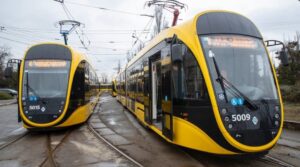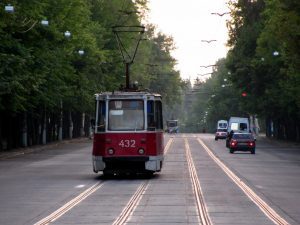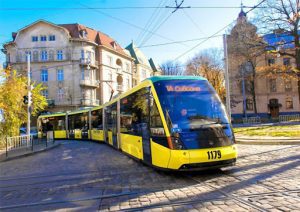
Kyivpastrans municipal enterprise intends to purchase five fully low-floor three-section self-propelled tramcars with a length of 25.5-28 m by December 31, 2025, for an expected amount of UAH 493 million 071.4 thousand.
According to Prozorro, the relevant tender was announced on October 18, with bids accepted until October 28.
The technical conditions stipulate that the trams should be produced no earlier than 2024, have at least 60 seats and at least one seat for a wheelchair passenger, and have USB ports for charging gadgets in the cabin.
In addition, the vehicle must have an autonomous range of at least 1 thousand meters on a horizontal straight line. The warranty period is 24 months from the date of commissioning.
The terms provide for 100% cash on delivery within five working days from the date the buyer signs the invoice for the actually delivered batch of goods.
According to the AllTransUA portal, two models of trams already in operation in Kyiv – manufactured by Polish Pesa and Ukrainian Tatra-Pivden – meet the criterion of the length of the cars stipulated by the technical specifications, while the car manufactured by Lviv-based Electron does not meet the requirements (the length of the three-section Electron tram is 19.5 m – IF-U).

The International Finance Corporation (IFC) of the World Bank Group can provide up to EUR27 million to the municipal transport company Shvidkisniy Tramway (High-Speed Tram) to procure 50 trams and rehabilitate 1 km of associated tramway line.
According to information on IFC’s website, the board of directors of the corporation intends to consider the relevant issue on December 21.
The tram vehicles will be operating on the existing underground and on the ground tram lines of the city and will be replacing obsolete vehicles.
The component relevant to the tramway line rehabilitation will take place on circa. 1 km section of Sobornosty Avenue, one of the main east-west transport arteries in the city center, located in the Metalurhiv district of Kryvy Rih. The construction is expected to start in April 2021 and to be completed by December 2021. The work involves dismantling the existing rail tracks and the overhead catenary, laying new tracks, mounting the catenary lines and final clean up and landscaping.
In parallel, as part of IFC’s Ukraine Cities Program, IFC is providing city with comprehensive advisory support to facilitate project implementation and increase its impacts. Activities include recommendations on improving sustainability and operational efficiency of transportation sector, reviewing tramway electric power supply system and related infrastructure to advise on capital modernization needs, as well as support in the technology specifications and selection of new low-floor energy efficient tram cars.
The project will enhance physical connectivity of remote districts and encourage tramway use, expected to contribute to the reduction of pollution and congestion in the city.

The European Investment Bank (EIB) within the framework of the Ukraine Urban Public Transport project is providing Lviv with EUR 12 million loans for the purchase of ten new low-floor trams.
According to the press service of the Ministry of Infrastructure of Ukraine, the relevant agreement between the bank, the Ministry of Infrastructure and the city authorities was signed on September 2.
According to the ministry, another EUR 8.8 million will be additionally financed from the city budget.
Head of the European Investment Bank representative office in Ukraine Jean-Erik DE ZAGON said the EIB loan for new trams in Lviv will contribute to the development of environmentally friendly and sustainable transport. As representatives of the climate-oriented EU bank, they are convinced that a well-functioning tram network can make a significant contribution to reducing the number of cars on roads and thus reducing environmental pollution and mitigating climate change.
Lviv Mayor Andriy Sadovy also supported this position.
“We have a clear position – electric transport should dominate. First of all, these are environmental issues, because 30% of all diseases in the world are caused by air quality. And secondly, it is financially profitable. In addition, low-floor trams and trolleybuses manufactured here, in Lviv, contribute to comfortable movement around the city for all its residents, including those with limited mobility,” he said.